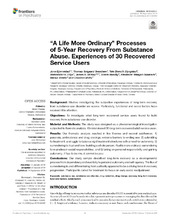| dc.contributor.author | Bjørnestad, Jone Ravndal | |
| dc.contributor.author | Svendsen, Thomas Solgård | |
| dc.contributor.author | Slyngstad, Tale Ekeroth | |
| dc.contributor.author | Erga, Aleksander Hagen | |
| dc.contributor.author | McKay, James R. | |
| dc.contributor.author | Nesvåg, Sverre Martin | |
| dc.contributor.author | Skaalevik, Alexander Waagan | |
| dc.contributor.author | Veseth, Marius | |
| dc.contributor.author | Moltu, Christian | |
| dc.date.accessioned | 2020-03-20T08:06:43Z | |
| dc.date.available | 2020-03-20T08:06:43Z | |
| dc.date.issued | 2019-09-18 | |
| dc.Published | Bjørnestad JR, Svendsen TS, Slyngstad TE, Erga AH, McKay JR, Nesvåg S, Skaalevik AW, Veseth M, Moltu C. “A life more ordinary” Processes of 5-year recovery from substance abuse. Experiences of 30 recovered service users. Frontiers in Psychiatry. 2019;10:689 | eng |
| dc.identifier.issn | 1664-0640 | |
| dc.identifier.uri | https://hdl.handle.net/1956/21546 | |
| dc.description.abstract | Background: Studies investigating the subjective experiences of long-term recovery from substance use disorder are scarce. Particularly, functional and social factors have received little attention. Objectives: To investigate what long-term recovered service users found to build recovery from substance use disorder. Material and Methods: The study was designed as a phenomenological investigation subjected to thematic analysis. We interviewed 30 long-term recovered adult service users. Results: Our thematic analysis resulted in five themes and several subthemes: 1) paranoia, ambivalence and drug cravings: extreme barriers to ending use; 2) submitting to treatment: a struggle to balance rigid treatment structures with a need for autonomy; 3) surrendering to trust and love: building a whole person; 4) a life more ordinary: surrendering to mainstream social responsibilities; and 5) taking on personal responsibility and gaining autonomy: it has to be me, it cannot be you. Conclusions: Our study sample described long-term recovery as a developmental process from dependency and reactivity to personal autonomy and self-agency. The flux of surrendering to and differentiating from authority appeared to be a driving force in recovery progression. Participants called for treatment to focus on early social readjustment. | en_US |
| dc.language.iso | eng | eng |
| dc.publisher | Frontiers | eng |
| dc.rights | Attribution CC BY | eng |
| dc.rights.uri | http://creativecommons.org/licenses/by/4.0/ | eng |
| dc.subject | substance use | eng |
| dc.subject | substance use disorder | eng |
| dc.subject | drug reduction | eng |
| dc.subject | drug change | eng |
| dc.subject | recovery | eng |
| dc.subject | long-term recovery | eng |
| dc.subject | functional factors | eng |
| dc.subject | social factors | eng |
| dc.title | “A life more ordinary” Processes of 5-year recovery from substance abuse. Experiences of 30 recovered service users | eng |
| dc.type | Peer reviewed | |
| dc.type | Journal article | |
| dc.date.updated | 2019-11-20T08:25:05Z | |
| dc.description.version | publishedVersion | |
| dc.rights.holder | Copyright 2019 The Author(s) | eng |
| dc.identifier.doi | https://doi.org/10.3389/fpsyt.2019.00689 | |
| dc.identifier.cristin | 1732543 | |
| dc.source.journal | Frontiers in Psychiatry | |

